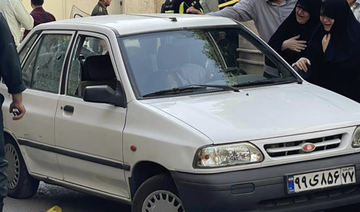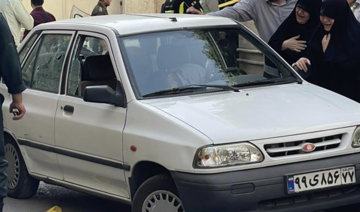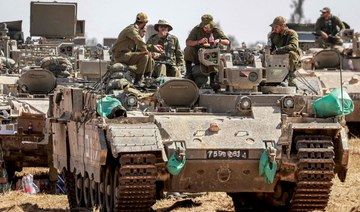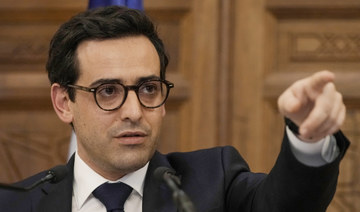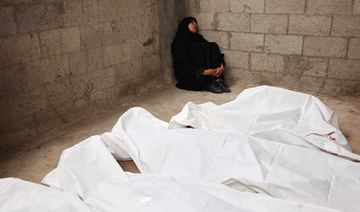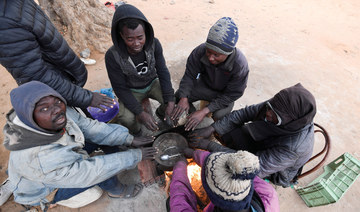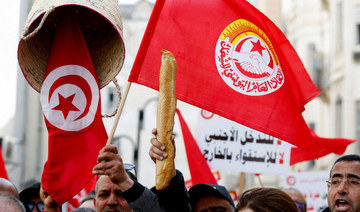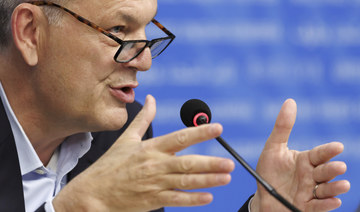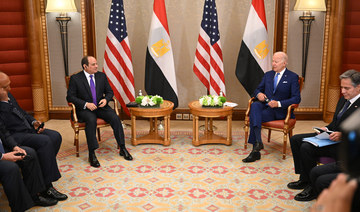TEHRAN, Iran: Thousands of mourners poured into the streets of Tehran on Tuesday to pay their respects to a senior Revolutionary Guard member fatally shot by two gunmen on a motorcycle earlier this week, punching the air with their fists and chanting “Death to Israel.”
The killing on Sunday of Col. Hassan Sayyad Khodaei bore the hallmarks of previous deadly shooting attacks in Iran blamed on Israel, such as those targeting the country’s nuclear scientists.
There has been no claim of responsibility for the attack. Iranian officials have blamed “global arrogance,” which is code for the United States and Israel, for Khodaei’s killing.
The funeral procession snaked through the main Tehran cemetery as mourners shouted anti-US and anti-Israel slogans. A prominent poster hailed Khodaei as a martyr along with Gen. Qassem Soleimani, the top Iranian general killed in a US drone strike in 2020 in Iraq, and featured tattered Israeli, American and British flags.
“Iran is a victim of terrorism,” the banner declared, overlaid with the logos of the Mossad and Central Intelligence Agency.
Guard commander Gen. Hossein Salami as well as Gen. Esmail Ghaani, leader of Iran’s expeditionary Quds Force, attended the funeral.
Ghaani also offered condolences at Khodaei’s home on Monday night. Iran’s nuclear negotiator visited the crime scene, underscoring the government’s shock. Iranian President Ebrahim Raisi vowed revenge. A street in Tehran has already been named after the colonel.
The 50-year-old Khodaei remains a shadowy figure, and Iran has yet to offer biographic detail beyond saying that he was a member of the elite Quds Force that oversees operations abroad through Iran’s allied militias across the Middle East. The Guard has described him as “defender of the shrine” — a reference to Iranians who support militias fighting the extremist Daesh group in Syria and Iraq.
The manner of the slaying evoked previous targeted attacks by Israel in Iran. In November 2020, a top Iranian nuclear scientist, Mohsen Fakhrizadeh, was killed while traveling in a car outside Tehran.
Women in black chadors wailed and wept over Khodaei’s coffin, an ornate box covered with flowers and draped with the Iranian flag and mourning symbols of the Shiite faith.
“We want revenge only,” Moghtaderi, one of the mourners, told The Associated Press at the funeral. She gave only her last name. “Enemies must be aware that we are loyal to the martyrs and their blood is so precious to us.”
Iranian security forces are still pursuing the assailants, who escaped, state media reported. Authorities have yet to make any arrests over the killing.
The procession took place as a sandstorm blanketed Iran, shuttering schools and government offices in the capital.
Meanwhile in the country’s central desert, a fighter jet crashed during a training exercise, killing two pilots, state media reported. Reports did not identify the cause of the crash at the Anarak training site near the central city of Isfahan. An investigation was underway.
Iran’s air force has an assortment of US-made military aircraft purchased before the 1979 Islamic Revolution. It also has Russian-made MiG and Sukhoi planes.
Decades of Western sanctions have made it hard to obtain spare parts and maintain the aging aircraft. Crashes occasionally happen among its faltering fleet. In February, a fighter jet plunged into a soccer pitch in the country’s northwestern city of Tabriz, killing both pilots and a civilian.
Iran is believed to have modeled its F-7 fighter after China’s jet J-7 that is considered a copy of the Soviet-era MiG-21. Beijing built the aircraft for export to countries including Pakistan, Iran, Sudan and North Korea. Iranian pilots for years have used the F-7 for training, with some mishaps.
Four years ago, an F-7 similarly crashed near Isfahan during an aerial exercise because of what was later described as a technical problem.
Thousands attend funeral for slain Guard colonel in Iran
https://arab.news/763uw
Thousands attend funeral for slain Guard colonel in Iran
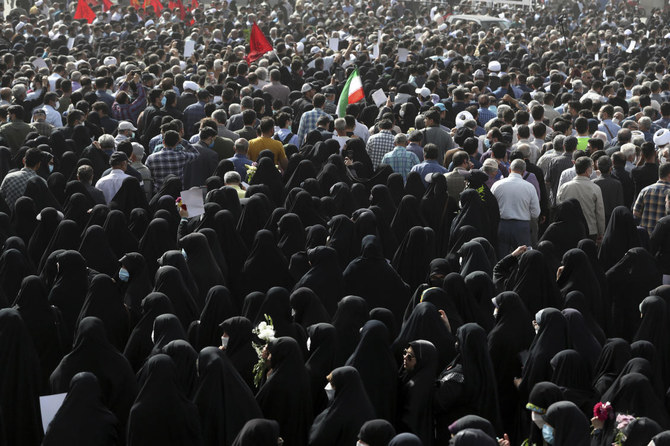
- The killing on Sunday of Col. Hassan Sayyad Khodaei bore the hallmarks of previous deadly shooting attacks in Iran blamed on Israel
- There has been no claim of responsibility for the attack
French foreign minister heads to Cairo as truce talks intensify
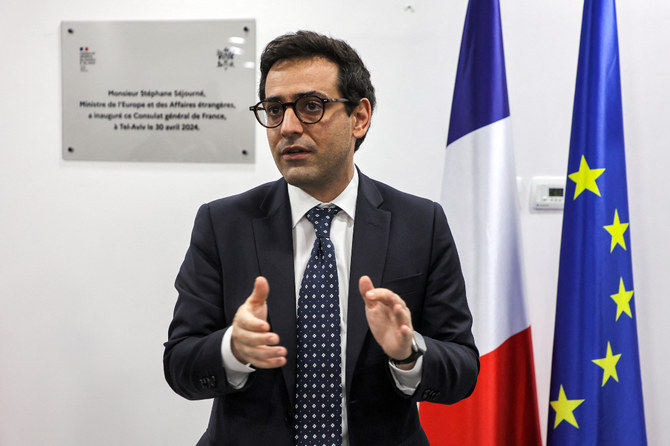
- Diplomatic efforts toward securing a ceasefire were intensifying following a renewed push led by Egypt
- France has three nationals still held hostage by Hamas after the group’s assault on Israel in October
TEL AVIV: France’s foreign minister will travel to Cairo on Wednesday in an unscheduled stop during a Middle East tour as efforts to secure a truce between Israel and Hamas in Gaza reach a critical point, a French diplomatic source said.
Diplomatic efforts toward securing a ceasefire were intensifying following a renewed push led by Egypt to revive stalled negotiations between Israel and Hamas, Gaza’s ruling Palestinian Islamist group.
“The surprise visit of the minister is in the context of Egypt’s efforts to free hostages and achieve a truce in Gaza,” the source said.
France has three nationals still held hostage by Hamas after the group’s assault on Israel in October.
Foreign minister Stephane Sejourne’s trip to Egypt follows stopovers in Lebanon, Saudi Arabia and Israel. He will likely want to assess whether those three hostages could be released and how close a deal actually is.
Sejourne, who saw Israeli Prime Minister Benjamin Netanyahu in Jerusalem on Tuesday, said in an interview on Tuesday that there was some momentum toward an accord, but that it would only be a first step toward a long-term ceasefire.
He warned that an offensive in southern Gaza City of Rafah would do nothing to help Israel in its war with Hamas.
Trucks bringing bodies and detainees into Gaza hold up aid says UNRWA
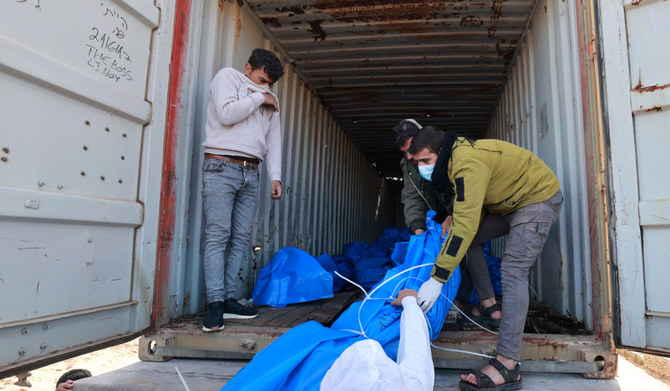
- Israel has killed more than 34,000 Palestinians, according to Gaza’s Health Ministry
- Asked for more details, UNRWA spokesperson Juliette Touma said that Israel had sent 225 bodies to Gaza in three containers since December that were then transported by the UN agency to local health authorities for burial, shutting the crossing temporarily
GENEVA: Trucks bringing both bodies and detainees from Israel back to Gaza through the main crossing point of Kerem Shalom regularly hold up aid deliveries, the head of the UN agency for Palestinian refugees said on Tuesday.
A deepening humanitarian crisis in Gaza has raised pressure on Israel to boost supplies into the enclave to curb disease among the 1.7 million people displaced by the Israeli-Hamas conflict and relieve hunger amid famine warnings from the United Nations.
UNRWA Commissioner-General Philippe Lazzarini told journalists on Tuesday that aid supplies into Gaza had improved in April but listed a series of ongoing difficulties including regular crossing closures “because they (Israel) are dumping released detainees or dumping sometimes bodies taken to Israel and back to the Gaza Strip.”
Asked for more details, UNRWA spokesperson Juliette Touma said that Israel had sent 225 bodies to Gaza in three containers since December that were then transported by the UN agency to local health authorities for burial, shutting the crossing temporarily. She did not have details of the circumstances of their deaths and said it was not UNRWA’s mandate to investigate.
On the detainee transfers, some of which have been previously reported by Reuters, she said that they had been transferred from Israel back to Gaza “dozens of times.”
Israel’s COGAT, a military branch in charge of aid, did not immediately respond to a request for comment. A spokesperson for the Israeli diplomatic mission in Geneva referred questions on the transfers to Jerusalem.
On aid deliveries, he said: “Mr. Lazzarini is deflecting from UNRWA’s own failures and responsibilities. Again today, there was a backlog of more than 150 trucks screened by Israel in Kerem Shalom not picked up by UN agencies.”
Tensions are high between Israel and UNRWA with the former accusing 19 UNRWA staff of involvement in the Oct. 7 Hamas attacks against Israel that killed 1,200 people and prompted the latter’s military campaign in Gaza. Israel’s allegations are being examined by UN investigators although a separate review found Israel has yet to provide evidence for accusations that hundreds of UNRWA staff are members of terrorist groups.
Kerem Shalom is one of just two crossings the UN says is currently open between Gaza and its neighbors Egypt and Israel.
Palestinian authorities have previously said that Israel has returned bodies from the Israeli-Hamas conflict after confirming they were not hostages. They said they were trying to identify them and figure out where they were killed.
Tunisian opposition wants political prisoners freed before taking part in presidential election
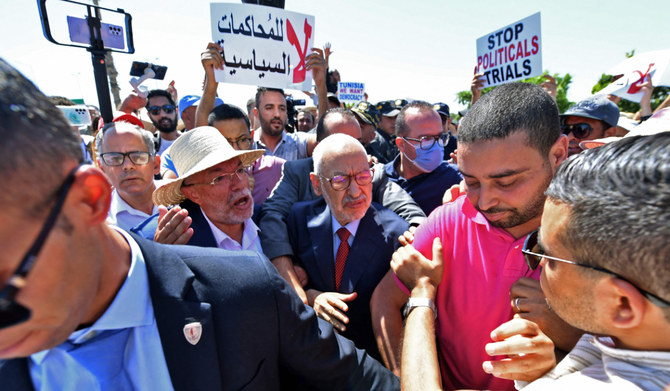
- Ennahdha’s headquarters were shut down a year ago, and its leader Rached Ghannouchi – a former parliament speaker – was sentenced to 15 months in prison on charges of glorifying terrorism
TUNIS, Tunisia: Tunisia’s main opposition coalition said Tuesday it won’t take part in the North African country’s upcoming presidential election unless President Kais Saied’s political opponents are freed and judicial independence is restored.
More than 20 political opponents have been charged or imprisoned since Saied consolidated power in 2021 by suspending parliament and rewriting the country’s constitution. Voters weary of political and economic turmoil approved his constitutional changes in a 2021 referendum with low turnout.
Saied is widely expected to run in the presidential election, likely to take place in September or October. It is unclear if anyone will challenge him.
The National Salvation Front, a coalition of the main opposition parties including once-powerful Islamist movement Ennahdha, expressed concern that the election wouldn’t be fair, and laid out its conditions for presenting a candidate.
They include freeing imprisoned politicians, allowing Ennahdha’s headquarters to reopen, guaranteeing the neutrality and independence of the electoral commission and restoring the independence of the judicial system, according to National Salvation Front president Ahmed Nejib Chebbi.
Ennahdha’s headquarters were shut down a year ago, and its leader Rached Ghannouchi – a former parliament speaker – was sentenced to 15 months in prison on charges of glorifying terrorism. His supporters say the charge is politically driven.
Under the constitutional changes Saied introduced, the president can appoint members of the electoral authority as well as magistrates.
Tunisia’s earlier charter had been seen as a model for democracies in the region.
Tunisia built a widely praised but shaky democracy after unleashing Arab Spring popular uprisings across the region in 2011. Its economic woes have deepened in recent years, and it is now a major jumping off point for migrants from Tunisia and elsewhere in Africa who take dangerous boat journeys toward Europe.
Israeli ground operation in Rafah would be ‘tragedy beyond words’: UN
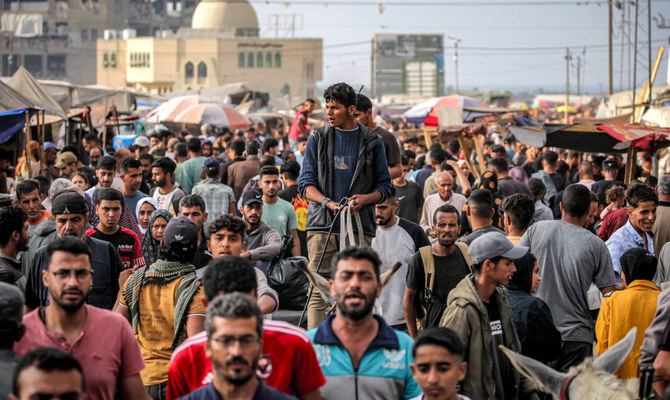
- “The world has been appealing to the Israeli authorities for weeks to spare Rafah, but a ground operation there is on the immediate horizon,” said Griffiths
UNITED NATIONS, United States: A ground operation by Israeli troops in the southern Gaza city of Rafah would be a “tragedy beyond words,” the UN’s humanitarian chief Martin Griffiths said in a statement on Tuesday.
“The simplest truth is that a ground operation in Rafah will be nothing short of a tragedy beyond words. No humanitarian plan can counter that,” Griffiths said, after Israeli Prime Minister Benjamin Netanyahu vowed to launch an offensive on Rafah, which has become a refuge to some 1.5 million Palestinians.
With Hamas weighing a truce plan proposed in Cairo talks with the US, Egyptian and Qatari mediators, Netanyahu vowed to launch the assault on Rafah “with or without a deal.”
Washington has joined calls on Israel from other countries and humanitarian organizations to spare the city for fear an army incursion would lead to massive civilian casualties.
“The world has been appealing to the Israeli authorities for weeks to spare Rafah, but a ground operation there is on the immediate horizon,” said Griffiths.
“For the hundreds of thousands of people who have fled to Gaza’s southernmost point to escape disease, famine, mass graves and direct fighting, a ground invasion would spell even more trauma and death.
“For agencies struggling to provide humanitarian aid despite the active hostilities, impassable roads, unexploded ordnance, fuel shortages, delays at checkpoints, and Israeli restrictions, a ground invasion would strike a disastrous blow.
“We are in a race to stave off hunger and death, and we are losing.”
The war in Gaza started after Hamas’s October 7 attack on southern Israel resulted in the deaths of 1,170 people, mostly civilians, according to an AFP tally of Israeli official figures.
Israel’s retaliatory offensive has killed at least 34,535 people in Gaza, mostly women and children, according to the health ministry in the Hamas-run territory.
Palestinian militants also took some 250 hostages on October 7. Israel estimates 129 remain in Gaza, including 34 believed to be dead.
Why Israel is so determined to launch an offensive in Rafah. And why so many oppose it
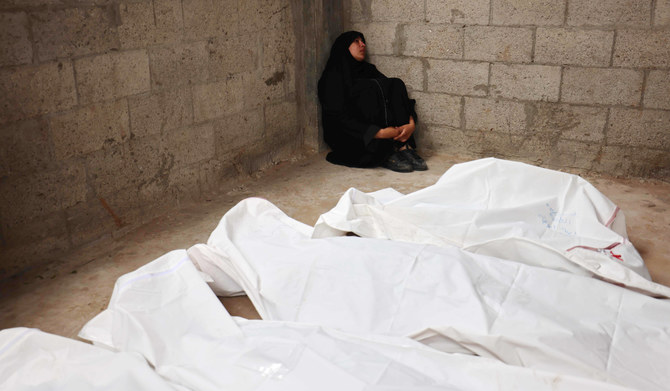
- Israel has killed more than 34,000 Palestinians, according to Gaza’s Health Ministry
- Palestinians live in densely packed tent camps, overflowing UN shelters or crowded apartments, and are dependent on international aid for food, with sanitation systems and medical facilities infrastructure crippled
JERUSALEM: Israel is determined to launch a ground offensive against Hamas in Rafah, Gaza’s southernmost town, a plan that has raised global alarm because of the potential for harm to more than a million Palestinian civilians sheltering there.
Even as the US, Egypt and Qatar pushed for a ceasefire deal they hope would avert an assault on Rafah, Prime Minister Benjamin Netanyahu repeated on Tuesday that the military would move on the town “with or without a deal” to achieve its goal of destroying the Hamas militant group.
“We will enter Rafah because we have no other choice. We will destroy the Hamas battalions there, we will complete all the objectives of the war, including the return of all our hostages,” he said.
Israel has approved military plans for its offensive and has moved troops and tanks to southern Israel in apparent preparation — though it’s still unknown when or if it will happen.
About 1.4 million Palestinians — more than half of Gaza’s population — are jammed into the town and its surroundings. Most of them fled their homes elsewhere in the territory to escape Israel’s onslaught and now face another wrenching move, or the danger of facing the brunt of a new assault. They live in densely packed tent camps, overflowing UN shelters or crowded apartments, and are dependent on international aid for food, with sanitation systems and medical facilities infrastructure crippled.
WHY RAFAH IS SO CRITICAL
Since Israel declared war in response to Hamas’ deadly cross-border attack on Oct. 7, Netanyahu has said a central goal is to destroy its military capabilities.
Israel says Rafah is Hamas’ last major stronghold in the Gaza Strip, after operations elsewhere dismantled 18 out of the militant group’s 24 battalions, according to the military. But even in northern Gaza, the first target of the offensive, Hamas has regrouped in some areas and continued to launch attacks.
Israel says Hamas has four battalions in Rafah and that it must send in ground forces to topple them. Some senior militants could also be hiding in the city.
WHY THERE IS SO MUCH OPPOSITION TO ISRAEL’S PLAN
The US has urged Israel not to carry out the operation without a “credible” plan to evacuate civilians. Egypt, a strategic partner of Israel, has said that an Israeli military seizure of the Gaza-Egypt border — which is supposed to be demilitarized — or any move to push Palestinians into Egypt would threaten its four-decade-old peace agreement with Israel.
Israel’s previous ground assaults, backed by devastating bombardment since October, leveled huge parts of northern Gaza and the southern city of Khan Younis and caused widespread civilian deaths, even after evacuation orders were given for those areas.
Israel’s military says it plans to direct the civilians in Rafah to “humanitarian islands” in central Gaza before the planned offensive. It says it has ordered thousands of tents to shelter people. But it hasn’t given details on its plan. It’s unclear if it’s logistically possible to move such a large population all at once without widespread suffering among a population already exhausted by multiple moves and months of bombardment.
Moreover, UN officials say an attack on Rafah will collapse the aid operation that is keeping the population across the Gaza Strip alive,. and potentially push Palestinians into greater starvation and mass death.
Some entry points have been opened in the north, and the US has promised that a port to bring in supplies by sea will be ready in weeks. But the majority of food, medicine and other material enters Gaza from Egypt through Rafah or the nearby Kerem Shalom crossing — traffic that is likely to be impossible during an invasion.
The US has said that Israel should use pinpoint operations against Hamas inside Rafah without a major ground assault.
After Netanyahu’s latest comments, US National Security spokesperson John Kirby said, “We don’t want to see a major ground operation in Rafah. Certainly, we don’t want to see operations that haven’t factored in the safety, security of” those taking refuge in the town.
POLITICAL CALCULATIONS
The question of attacking Rafah has heavy political repercussions for Netanyahu. His government could be threatened with collapse if he doesn’t go through with it. Some of his ultranationalist and conservative religious governing partners could pull out of the coalition, if he signs onto a ceasefire deal that prevents an assault.
Critics of Netanyahu say that he’s more concerned with keeping his government intact and staying in power than national interest, an accusation he denies.
One of his coalition members, Finance Minister Bezalel Smotrich, said Tuesday that accepting a ceasefire deal and not carrying out a Rafah operation would amount to Israel “raising a white flag” and giving victory to Hamas.
On the other hand, Netanyahu risks increasing Israel’s international isolation — and alienating its top ally, the United States — if it does attack Rafah. His vocal refusals to be swayed by world pressure and his promises to launch the operation could be aimed at placating his political allies even as he considers a deal.
Or he could bet that international anger will remain largely rhetorical if he goes ahead with the attack. The Biden administration has used progressively tougher language to express concerns over Netanyahu’s conduct of the war, but it has also continued to provide weapons to Israel’s military and diplomatic support.



